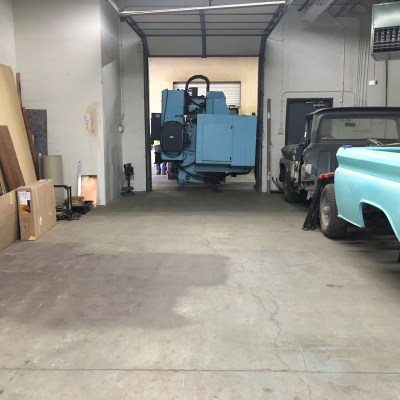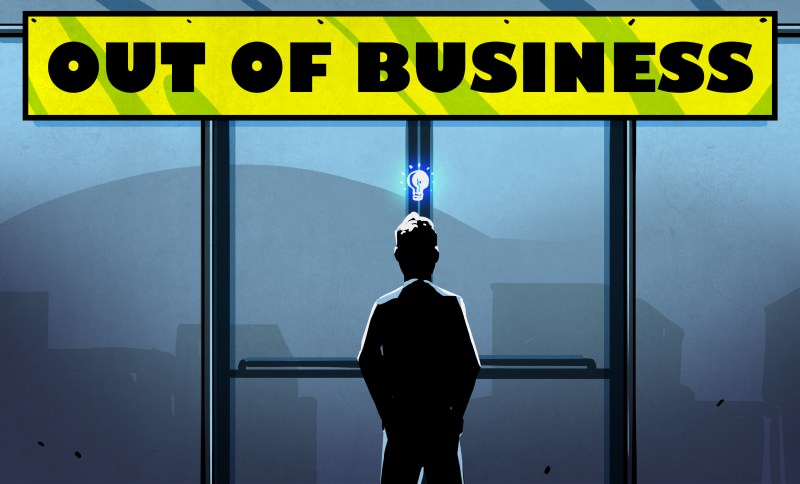Some of our more dedicated readers may remember me as that promising and talented new writer who disappeared after only a couple of months last fall. Or, alternatively, that moronic new writer who had no idea what he was talking about. But, I’m just going to go ahead and assume it was the former in order to protect my ego. In either case, if you remember me at all, you may have wondered why I left. Was it cholera? Was I drafted into a top-secret CIA program? Did I join a circus as a fledgling trapeze artist?
No, it was none of that. That would be absurd. What would make you think I had any trapeze skills at all, much less circus-worthy ones? The truth is a lot more straightforward, but was also a lot scarier (and more exciting) for me — I started a business. The astute readers among you have probably already put the dots together and figured out that I failed. The title was a pretty strong hint, right? This isn’t a story of bootstraps-pulling success, or a heartwarming underdog tale. This is an opportunity for me to talk about the lessons I learned as I failed, and to give the entrepreneurs out there something to consider when they start their businesses. We’ll laugh together, we’ll cry together, and maybe we’ll even learn something together. Ready? Alright, let’s dive right into the heart of it, starting when I was seven years old…
Entrepreneurial Spirit and The Hustle
The first time I remember embarking on a money-making endeavor, I was seven years old. It was the mid-nineties in California, and roller blades were finally on their way out. Everyone had a pair or two sitting unused in their garage. A friend and I, in a fit of boredom, decided to take a pair apart, and found that it was fun to see how far we could get the “blade” portion to roll with the boot removed. For some reason, we thought other kids at our school might want to do this too. So, we offered to provide a roller blade boot removal service for the nominal fee of $5. Somehow, I think we even managed to sell our services to a few of our friends.
Obviously, our silly little business venture went nowhere. But, I’m willing to bet a large portion of you have similar stories. Maybe you had one of those quintessentially American lemonade stands (maple syrup stand for you Canadians?). Maybe you mowed your neighbors’ lawns in the summertime for some spending money. Or, maybe you had a more adventurous business plan. Whatever the case, if you’re reading this there is a very good chance that you chuckled at my roller blade conversion business in commiseration, because you’ve got a similar story yourself.
Like me, as you got older your ideas grew more sophisticated and took increasingly more knowledge and skill. As a Hackaday reader, you probably looked to your tech skills. I’ve started more websites than I can remember, offered computer repair services via Craigslist, and tried my hand at making computer games and apps. And, once again, I’m confident a lot of you have to.
I bring all of this up to illustrate the point that entrepreneurial spirit seems to be an innate trait in a lot of us. It’s constantly in the back of our minds, flooding our thoughts with potential business ideas, products, and inventions. More importantly though, it drives us to action. We may do it out of necessity, but sitting in a cubicle making someone else money can never satisfy us. And so, we act.
Taking Action
It was this situation that I found myself in last October. I was in the middle of a divorce, and was finding myself increasingly disinterested in the daily grind of office work. I had a good job and was well into a secure career. But, I couldn’t concentrate on my daily tasks – I was simply burned out. I yearned to go out into the world and see what I could accomplish. I wasn’t quite sure what I was going to do, but knew I couldn’t continue with the 8 to 5 office life.
And so, without really having a plan, I told my boss that I was sorry, but I couldn’t continue to work there. I wasn’t satisfied with my own productivity, and that was the best choice for myself and the company. Luckily, it was right after I made that decision that I received an email from Hackaday’s Mike Szczys, offering me a job as a contributor here. I immediately jumped at the opportunity, and got to writing.
The house my ex-wife and I had lived in was put on the market and quickly sold (thanks to Denver’s insane real estate market). She and I were each able to walk with a little bit of money, and no debts. Of course, I did what all entrepreneurs do when they find themselves with some money: I started tossing around business ideas. I formed an LLC, threw together a business plan and a website, and on New Years Day of 2016, I started a lease on an office and shop space.
Making Mistakes
This was my first “real” business, one that wasn’t just run from my home. And, the mistakes started immediately — beginning with the lease on my office. In future articles on this subject, I’ll go into more detail about what you should look for in a business lease, and what you should avoid. But, suffice it to say that I really had no idea what a good and fair lease looks like, and so I signed a lease without really knowing what I was getting into. As it turns out, not all business leases are created equal, and mine essentially gave away all of my rights as a tenant.
Aside from not understanding the legalese of what I was signing, I also leveraged myself too far. In the beginning, I had a decent chunk of money, and felt that I could afford a decent size space (1,800 sq. ft.). I thought I’d need the space eventually, and figured it’d be best to just go ahead and get it. In retrospect, I should have kept my overhead as low as possible and leased a space that was as small as I could get away with.
Which bring us to my next mistake, and this one is a doozy — I really didn’t have a clear idea of how I was going to be creating revenue. I had a business plan, and a vague idea about providing design and prototyping services. My background, after all, was in mechanical design, CNC programming and operation, and 3D printing. It seemed like a good fit, and I figured the details would fall into place once I actually got started.

That plan, however, ended up being short-lived. Prototyping services are generally only contracted by large companies who want to outsource that work, and those companies want to work with proven companies and not startups. My goal was to target other small companies and startups, but that plan was flawed (those companies generally can’t afford services like that). So, I shifted my focus to what I dubbed “designer fabrication,” which to me meant fabrication services that went further than normal “job shops,” and into the territory of custom one-off design and fabrication.
In an effort to jumpstart that plan, I purchased a lot of equipment and tools I thought I was going to need, which ended up being my next mistake. This one probably seems obvious, but there is really no reason to buy a tool or piece of equipment before you have a proven need for it. Even if a customer’s project demands a certain tool, you’ve still got to weigh the return on purchasing that tool. It might make more fiscal sense to simply subcontract that part of the job, rent the tool, or turn down the project altogether. But, of course, tools are toys for grownups, and I wanted some new toys to play with!
So, I found myself in a big shop, full of shiny new tools, and no client contracts to use them for. I was three months in before I even had my first paying contract, and had already burned through all the cash I had started with. I was already taking on debt — after all I had rent to pay at my apartment, food to buy, car payments to make, bills to pay, a business lease to cover, and materials to buy for the projects.

As time when on, this problem just got worse. I had contracts coming in here and there, but they weren’t enough to cover my business and personal expenses, and my debt was mounting. Of course, I didn’t want to give up. A combination of the sunk-cost fallacy and simple stubbornness kept me going, even when I should have either cut my losses or re-evaluated my business plan. I was still clinging to the hope that I’d turn a corner, get more contracts or come up with a lucrative product to sell, and that I could still succeed.
Taking the Hint
This was the situation I found myself in about a month ago: I was completely out of cash, I had maxed out every credit card I had and couldn’t get more, no one would approve a business loan for a business with negative cash flow, and I had borrowed what I could from family. I was broke, in a mountain of debt, and in a constant state of panic. How could I have let it get that bad? Why hadn’t I just worked harder? Why had I made so many stupid decisions?
I spent the first two weeks of this month trying to figure out some sort of solution. I found someone to split my shop space with me, cutting my rent in half. I sold everything I could that I didn’t actually need. I started looking for part-time work to supplement the meager income from clients. But, with even more expenses mounting, I knew I had to call it quits.
A week ago, I decided I’d have to close the doors on my business. And, at least temporarily, on the idea of being a business owner. That brings us to today. I’ve been scrambling to sell off my equipment by the end of the month (taking heavy losses, of course), in order to pay back open client contracts and other financial commitments. And, in general, just to figure out how to move on.
Luckily, the fine folks here at Hackaday have welcomed me back as a contributor. I’ve got a long road ahead of me, with a pile of debt to start chipping away at, ruined credit to rebuild, and security to regain. But, I’ll tell you a secret: that entrepreneurial spirit hasn’t left me. I don’t regret trying to make this business happen. Sure, I wish I had gone about it differently, but I know I never would have been satisfied with not trying. I’ll almost certainly try again at some point.
If you’ve read this far, you probably have that same spirit, and that need to start something. You may have even related with my story, and nodded along as you read about my mistakes. Or, maybe you’re simply thinking about starting your own business, and want to read about what not to do. So, stick around and keep a look out for future articles, where I’ll go into more depth on how to avoid the pitfalls I fell into. I’ll talk about what I did right, and what I did wrong. And, most importantly, I’ll let you laugh at my mistakes, as you breathe a sigh of relief knowing that we entrepreneurs may screw up a lot, but at least we try.
















I watched my dad do something similar growing up. Thought it was the coolest thing at the time, til I realized he blew a 30k inheritence on shop equipment that virtually never got used. He is/was a welder of the highest caliber, and decided to build a pre-CNC machine shop.
. . . Problem was, he didn’t advertise his capabilities, charged by the job (and often worked too slow and at a loss), and preferred welding to machining, which he still does. Long story short, everything was slowly sold for scrap and the whole experience became a lesson for me in what NOT to do . . .
Nothing wrong with diving in head first, and I’m in awe of the fact that you had the balls to do it – Seems like you had the same problem I have to keep reminding my dad of though – Whatever you want to sell/provide, you have to actually establish that BEFORE you even consider the business aspects.
. . . elsewise it’s an underpants gnome situation
I’m in business for myself and didn’t go full time until I had the business to justify it, which was over four years from when I started it. I probably learned that from my dad who did just that a decade or so before. Being in business means having to learn to discriminate between what you need and what you don’t really need. As with gambling, don’t bet more than you can afford. I tend to not buy things unless I have an order that needs it or I have at least half a dozen plans on how to make it pay back. And don’t buy a tool for a specific job if you don’t really need to.
“What It’s Like to Quit Your Job and Start a Company – Then Fail”
Ask all the small businesses that failed (or are going to fail) because of the un-affordable “Affordable Care Act” (ACA, a.k.a. “Obamacare”).
As one who is working up to buy the business from my boss, I appreciate your insight. I have pretty much been left to run the place by myself (except for paying bills and invoicing, although I do have to call customers to “remind” them that they’re behind on payments). This has helped me realize that a lot of preconceptions that I’ve had about the business are wrong. I’ve also found that some ideas I’ve had are spot-on as well. I realize that buying an existing business is different from starting from scratch, but it’s not completely different. In my situation it’s about the same–I have to buy inventory and equipment then pay monthly installments.
I know someone who started out selling 49cc scooters–just the scooters and it almost bankrupted him with all of the warranty returns.. He slowly learned that he could make more money by selling service and extended warranties than he could with just the scooters. This taught him that you can’t cater to a specific area of a specific market. You have to be willing to expand, even if it is in a specific market. He’s now selling accessories and batteries to keep afloat and the scooters to make a profit. There was a time when the parking lot was full of people (mainly parents with lots of discretionary funding buying cheap scooters to give their teenagers something to do). Now that the market is really soft, he’s lucky to sell 2 scooters a month.
There are many things when considering real estate. As you’ve found out, leases can chew you up, spit you out, chew you up again, then leave you in a stinky pile that someone has to scrape off their shoe. The above guy moved his scooter shop to a local shopping center with better benefits–highway visibility, plenty of parking, decent rent because it was a new building. Sounds great, right? When the lease ended after the first year, they tripled his rent and were forcing him to pay for maintenance (leaky roof, plumbing issues, parking lot repairs, etc.). He quickly moved back to where he was–on the outskirts of town where rent was cheap and traffic is nearly non-existent. He took it as a lesson learned. That gilt egg may be a spray-painted turd.
Right now, I’m building up a bank in my off-time by selling various electronics online that I find at flea markets, Goodwill, etc. That money is not to be touched, even in an emergency (because *anything* could be an emergency), because it is for buying the business. Once I reach a couple of grand, it’s going to a CD so I can’t touch it for a couple of years without losing part of it.
Most cities have a chamber of commerce that will contain a wealth of information regarding setting up a business, pitfalls you may encounter, resources needed to get things running, and mentoring programs for budding entrepreneurs. Businesses are not for the faint-of-heart.
As I’ve been told several times, you have to invest in yourself before investing in a business. This means realizing your shortcomings, then correcting them! If you have problems with impulse control, you would do well to seek professional counseling. I used to have issues with follow-through. This was mainly because I refused to ask for help, especially when doing something out of my realm of expertise, because I didn’t want to “burden” anyone with my issues. I noticed what that was doing to my kids when they were really young. I got help and now I can accomplish 90% of my projects.
The only stupid thing about making a mistake is not learning from it. You had the gut’s to try , and I hope(and believe) you will try again, and you may fail again for different reasons, but you had the nerve to go after it the first time, and that is a great deal more than many can say. There is never a prison so strong as the ones we build for ourselves.
I suggest a read of Joel Spolsky’s blog on running his business – it’s a recommendation for everyone. It will make you appreciate a well run business and how to make good business decisions and being satisfied with the results.
And the paper by the founder of Sherline. Both crystallize for me the challenges, benefits, and risks based on the experience of people who did not fall into an upwelling market that makes success easy.
4 out of 5 businesses fail in 5 years. Of those that do survive, 4 out of 5 fail. That’s 20 percent of 20 percent that survive. FOUR PERCENT! Of that 4%, a lot of them are making very low pay and working crazy long hours just to “be in business for myself”. They don’t get group health insurance, a pension, a 401K contribution, a lot of perks. You have to be a pretty big success story to be better than the average career path job. When you are married, at some point your wife packs up herself and the children and leaves. A life of continued failure is no way to live for most people. Things to think about.
@Cameron Coward – Please don’t give up. I imagine that must have some decent skills. You should start a blog with your projects if you haven’t already. Make instructional videos and the like. Heck put some cool stuff up here on hackaday. Many freelance software developers go this method. Beat the bushes and find customers. If you do good work your customers will be your best marketing and get you more work. Your best method may be to work as a hired gun and go on-site for people. Start-up do hire these types when they don’t want to commit to an employee. An example was a guy doing well for himself helping companies setup industrial automation and test fixtures. He was an expert in labview and had acquired the skill working on a failed PhD. You need to become known to the circle of startups in the town. I have seen folks making an OK living this way. Step by step. Maybe someday you can have a large fabrication space. Thanks for sharing this.
Everything in this post and these comments is the result of market saturation or no market at all..
A rehash of the DotCom Boom. Companies that do nothing anybody would pay for being run by children paying themselves millions to do nothing.
Everyone thinks the reason they don’t cover with a PC shop, freelance developer service, or whatever else is they didn’t calculate something right. If you don’t acquire enough clients you have to minimize till not functioning because that’s the only place you’re getting your currency from.. Execs and entrepreneurs paying themselves without really doing something is a problem in trading and banking and where investment funds were carelessly dumped in to their control.
Kudos for sharing this (with your real name at top of the article) and good luck if you try again! “You learn from your errors” (or something like this, translating is difficult)
Does anyone need help? I need a job bad ATM!
Cameron, two questions and a comment:
1.) Did you read about Lean Startup? The goal with that is to fail cheaply and maximize your startup runway. Smart stuff. You could still run a side business even now.
2.) Where are the rest of the promised articles on this theme? I’d like to read more.
3.) I understand your burn out. That’s a legit problem. I went thru something similar at that age. Doing better now?